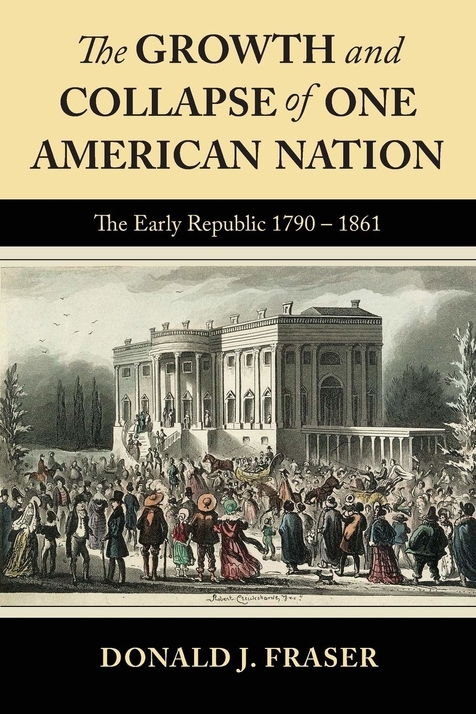
Donald J. Fraser has created a detailed view of the early years of the American republic as it gradually narrowed towards the turmoil of civil war in The Growth and Collapse of One American Nation.
In the first decade after the founding of the nation, political parties – Federalism and Republicanism – developed almost immediately. In the mix, the fascinating George Washington was slightly right of center, believing that governance couldn’t rely on people’s nature since we often cannot control that nature, as he sometimes had trouble controlling his own.
By contrast, Thomas Jefferson, more to the left philosophically, believed that most ills arise from structural injustices that might include income disparities. Hamilton was the farthest right, convinced the elite could control its self-interest for the good of all. Major questions of the time seemed to require the precise identification of the dangers to peaceful society, coming in the wake of rapidly developing industry, agriculture, and world trade in the new, grandly experimental American democracy.
In 1796 there was an election that we Americans might recognize in modern times, though it was conducted without the added goad of widespread media, or indeed, of campaigning as we think of it. Within limited circles, Jefferson was maligned for his affair with Sally Hemmings. John Adams was depicted as a monarchist – and overweight. Adams won and Jefferson became Vice-President by the system of the day, the two sustaining mutual regard.
The late 1700s brought territorial interests and a war with France ending in expansion via the Louisiana Purchase. Westward extension exacerbated the Indian question. While Jefferson wished to believe that the Indians could be civilized, the reality of dealing with native tribes required a pragmatic approach, generally war and/or removal. Slavery took hold by the early 1800s, evoking for more dangerous and delicate issues that would ultimately lead to the Civil War. As Fraser propounds, that conflict brought an end to national unity that would require great national will to restore.
Fraser’s new book, a sequel to his well-received The Emergence of One American Nation, follows our early founders as they cope with the multi-layered problems of turning a set of high ideals into a methodology that could somehow suit all exigencies of governance without sacrificing democratic cohesion. His behind-the-scenes portraits of such players as Jefferson, Hamilton, Jackson, and Lincoln will make the book more than just history for readers who appreciate facts delivered in a personal and, at times, cinematic manner.
This is not a work of lightweight “popular history,” but given the situations, and the protagonists, the tale Fraser is telling is riveting throughout. That said, in the wrong hands these subjects could be as dry as a textbook and Fraser is adept at combining factual information and enough creative liberty to make these well-known moments come alive, while still retaining historical accuracy.
What is most telling about these chronicles is that Fraser tells a story that is of a much different time, but one that is not so dissimilar from today. Political backbiting has no era, and polarization has been a problem throughout the country’s history. This is not to say the media age hasn’t writ its own problems, but they’re very often the same problems writ large – which is at once immensely interesting and somewhat dispiriting that so many of these issues are timeless, and seemingly intractable.
Fraser’s many footnotes leave no doubt as to his diligent research, overlaid with the zeal for his subject matter. He suggests in the conclusion to his book that race is still an issue, with the current socio-political dynamics in the American nation bearing this out most dramatically. He harkens back to the words of Martin Luther King for inspiration, ending with the sanguine message that we can “strive to unleash, in Lincoln’s words, ‘the better angels of our nature,’” giving the book a sense of hope for the future as outlined in the country’s history.
Book Links
STAR RATING
Design
Content
Editing
Get an Editorial Review | Get Amazon Sales & Reviews | Get Edited | Get Beta Readers | Enter the SPR Book Awards | Other Marketing Services























Leave A Comment